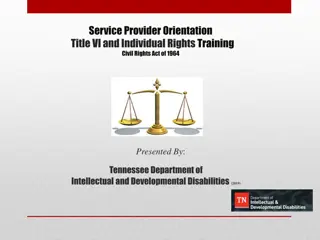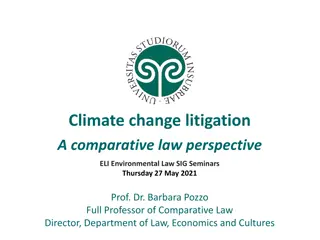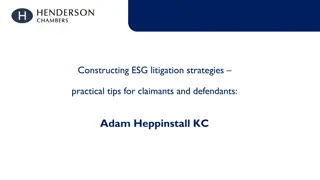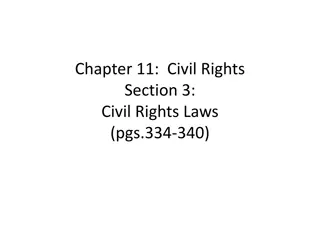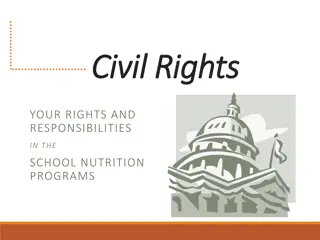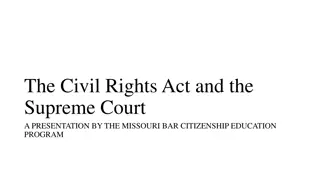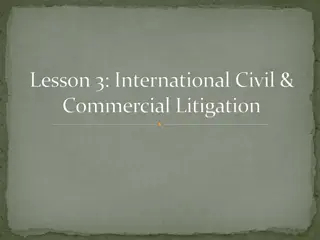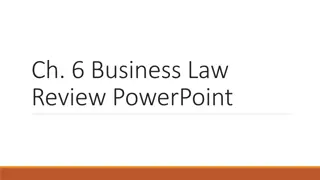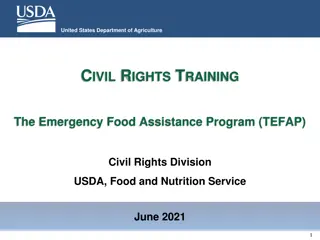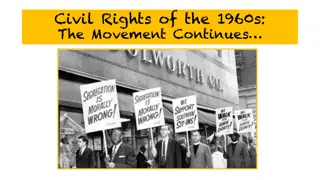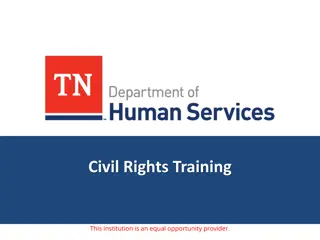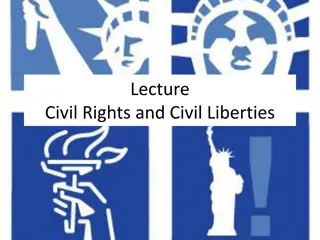Civil Rights Litigation Steps Overview
Exploring the detailed process of civil rights litigation, covering steps from fact gathering to trial preparation and post-trial activities. The visual presentation showcases key elements such as client retention, complaint filing, discovery phases, trial preparation, and post-trial procedures like analyzing appeal issues.
Download Presentation

Please find below an Image/Link to download the presentation.
The content on the website is provided AS IS for your information and personal use only. It may not be sold, licensed, or shared on other websites without obtaining consent from the author. Download presentation by click this link. If you encounter any issues during the download, it is possible that the publisher has removed the file from their server.
E N D
Presentation Transcript
VOTING RIGHTS POLICY & THE LAW Matt Barreto & Chad Dunn November 9, 2021
TODAYS OVERVIEW Final Syllabus Overview Litigation Steps Jury Selection Techniques 1. 2. 3. But first any voting rights / redistricting in the news?
CIVIL RIGHTS LITIGATION STEPS Fact gathering and investigation Client Retention Document preparation Complaint Discovery Retainer Agreements Preliminary Expert Analysis Preliminary List of Fact and Expert Witnesses
CIVIL RIGHTS LITIGATION STEPS Media contacts and strategy Fundraising and Case Expenses Complaint Filed Scheduling Rules 26(f) &16, Fed. R. of Civ. Pro. First round of dispositive motions Rule 12, Fed. R. of Civ. Pro.
CIVIL RIGHTS LITIGATION STEPS Discovery Rule 26, Fed. R. of Civ. Pro. Initial Disclosures Interrogatories Requests for Production Rule 45 Subpoenas Depositions Expert Disclosures Expert Depositions Second round of dispositive motions Rule 56, Fed. R. of Civ. Pro.
CIVIL RIGHTS LITIGATION STEPS Trial Preparation Finally supplement disclosures Witness list Exhibit list Motion in Limine Juror Questionnaire/Voir Dire (if applicable) Witness travel and witness order Technology and document presentation Trial depositions Trial stage assignments Pre-trial briefs
CIVIL RIGHTS LITIGATION STEPS Trial Pre-trial hearing Remaining motions Witness order and schedule issues Admissibility of exhibits Admissibility of testimony and deposition excerpts Jury Selection (if applicable) Opening Statements Plaintiffs evidence Defendants evidence Directed Verdict motions Closing arguments
CIVIL RIGHTS LITIGATION STEPS Post-Trial Exhibit organization Transcript correction Prepare press statements Receive court ruling Analyze appeal issues Post decision motions Rule 59, Fed. R. Civ. Pro.
VOIR DIRE GOALS Earn Trust Introduce Case Fence in the other side Sift out the jurors you cannot win Build your jury relationship Prepare the jurors to enter your verdict Be respectful of everyone s time 1. 2. 3. 4. 5. 6. 7.
INTRODUCTION ISSUES Tell the jurors that this is a very big and a very important case. Do a SHORT summary of the case and the relief we are seeking. This summary should take no more than 2 minutes. Tell the panel that, Being a good juror and a good citizen means that if this case is not the right one for you to serve on, just let the lawyers and Judge know. Tell the jurors there are no right or wrong answers to the questions you will be asking. All that you are asking of the jury is that they be honest and forthright in their answers. Tell the jurors that it s been your experience that many jurors believe that if they don t talk, they won t be selected. Then tell the jurors that the quickest way to be selected is not to say anything. In other words, jurors who talk, walk. Jurors who have nothing to say, stay! Bias or Prejudice: Explain to the jurors that when lawyers refer to a juror having a bias or prejudice, they mean a pre-judgement, leaning or favoring one side over the other. Tell the jurors that if they have any pre-judgment or a leaning about any of the issues, to please let you know. Preponderance of the Evidence: Is there anyone who feels that we should have to prove our case by more than a preponderance of evidence? 1. 2. 3. 4. 5. 6.
LEGAL ISSUES Preemptory Challenges any reason Challenges for Cause: Pecuniary interest in the case, employee of Plaintiff or Defendant, closely related to a party in the case Bias or prejudice re: party Bias or prejudice re: subject matter Test: The panel member cannot be fair and impartial because his or her feelings are so strong in favor of or against a party, or in favor of or against an issue, with respect to the subject matter, that the juror s verdict will be based on these feelings and not on the evidence Because of past experiences or personal beliefs, a juror has such strong feelings on a subject that they would not be able to put aside their feelings to follow the judge s instruction on the law 1. 2. 3. 4. 5. 6. 7.
MISC ISSUES Think or feel? Research Rehabilitation Don t forget to ask about parties and witnesses What and when do you learn about venire What are you allowed to do on your own 1. 2. 3. 4. 5.
I am likely to believe the testimony of a prison guard before I will believe the testimony of a prisoner. 1. Strongly Agree 2. Somewhat Agree 3. Somewhat Disagree 4. Strongly Disagree
A PRISONER IN STATE JAIL WHO DID THE CRIME SHOULD DO HIS TIME AND NOT COMPLAIN WHEN PRISONER OFFICIALS VIOLATE PRISON POLICY. 1. I STRONGLY AGREE 2. I SOMEWHAT AGREE 3. I SOMEWHAT DISAGREE 4. I STRONGLY DISAGREE
PEOPLE IN PRISON HAVE TOO MANY RIGHTS. 1. STRONGLY AGREE 2. SOMEWHAT AGREE 3. SOMEWHAT DISAGREE 4. STRONGLY DISAGREE
It should be hard for people in prison to make complaints about the prison conditions. 1. Strongly Agree 2. Somewhat Agree 3. Somewhat Disagree 4. Strongly Disagree
The fact that a person has been convicted to serve time in prison makes him unbelievable. 1. Strongly Agree 2. Somewhat Agree 3. Somewhat Disagree 4. Strongly Disagree
When it comes to government requirements to attempt to award some government contracts to historically underutilized businesses such as those owned by women, African- Americans, Asian Americans or Hispanics, 1. I strongly agree 2. I somewhat agree 3. I somewhat disagree 4. I strongly disagree
Certain contractors and businesses have an inside track for being awarded important and lucrative government contracts. 1. Strongly Agree 2. Somewhat Agree 3. Somewhat Disagree 4. Strongly Disagree
At the end of this case, you will be given some instructions and verdict questions from His Honor. One of those verdict questions will ask you what amount of money, if any, should be awarded to Gil, for his harm and losses. We will be asking you to award approximately $x million. Are there any of you who have concerns, even a little bit, that you could not award a figure of that amount even if the evidence supported doing so?
FOR NEXT WEEK: Continue to Collect Jurisdiction Data and Evidence Read Texas Voter ID readings



